One of the ill-intentioned arguments of some organizations and individuals against Vietnam is to distort that Vietnam does not have freedom of speech and freedom of the press. However, their arguments mostly involve confusing the concepts of freedom of speech and freedom of the press with freedom of speech and freedom of the press.
The true meaning of freedom of speech, freedom of the press
Freedom is inherently a fundamental human right, but along with that is the awareness and behavior in accordance with the community, nation, and people, to respect the freedom of others and comply with the law. Article 29 of the 1948 " Universal Declaration of Human Rights" of the United Nations states: "Everyone has duties to the community, in the exercise of his rights and freedoms, to be subject only to such limitations as are determined by law solely for the purpose of securing due recognition and respect for the rights and freedoms of others and of meeting the just requirements of morality, public order and the general welfare in a democratic society."
Freedom of speech and freedom of the press are two concepts in the same field, only different in level. The press is a forum in a developed society, for all citizens, all classes, all ages, genders, different professions to have the right to speak, express thoughts, opinions, demonstrate actions and the press becomes the place where freedom of speech is expressed most concentratedly, strongly and widely.
That is why freedom of the press becomes a special concern everywhere, in every country, in every political and social system. Whether in the capitalist press or the socialist press, the press has common functions such as: Informing, reflecting, forming and orienting public opinion, educating, entertaining...
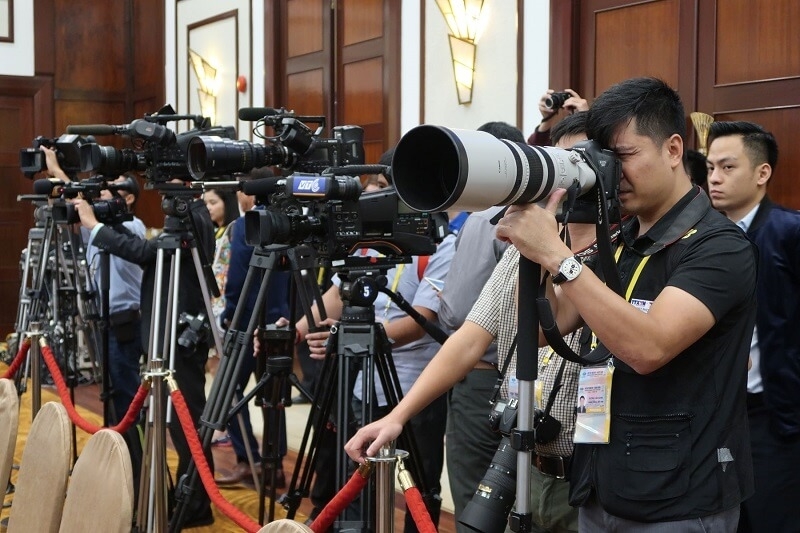 |
| The press is given favorable conditions to work in Vietnam. Illustration photo: cand.com.vn |
These basic functions create for the press a social responsibility, for the common progress and development of society, towards the universal values of human happiness. Therefore, when exercising the right to freedom of the press, it must also be associated with those functions, not going against the values of truth, ethics, culture, not against the common security of the community, not contrary to the progressive trend of humanity.
President Ho Chi Minh had a very clear explanation about freedom of speech and freedom of the press as follows: “What is freedom? On all issues, everyone is free to express their opinions, contributing to finding the truth... Truth is what is beneficial to the Fatherland and the people. What is contrary to the interests of the Fatherland and the people is not the truth.” Thus, it can be seen that true freedom of the press must be based on a democratic, good, humane society, and all press activities serve the interests of the majority of people.
There is no pure, absolute freedom of the press, standing outside of society, community, political institutions and stifled in a dictatorship, when the ruling class has become an obstacle to social progress. There is no right to rise above the economic regime and the social development determined by that economic regime. There is only freedom of the press in a democratic society, when the ruling class has a progressive role in leading society.
In practice, almost all different political regimes consider opposing the government as a violation of the law and there is no document that considers freedom of speech and freedom of the press as absolute rights. As Secretary-General of the United Nations, Mr. Ban Ki-moon once said: “Freedom of speech is protected when it is used for the purpose of justice and community... When some people use this freedom to provoke or insult the values and beliefs of others, that action will not be protected.”
Beware of plots to promote "free speech, free press"
In the arguments criticizing Vietnam for not having freedom of speech and freedom of the press, it can be seen that the arguments deliberately focus on the first part of the 1948 "Universal Declaration of Human Rights", affirming that freedom of thought and freedom of publication are basic human rights, while omitting the second part that such freedom is within the legal and institutional framework of each country.
Instead of considering the relationship between the Constitution, the law and practical press activities, hostile and ill-intentioned forces only focus on specific cases and individuals to distort freedom of speech and freedom of the press in Vietnam. The concepts they use are "free speech" and "free press", which are close to the concept of absolute freedom, without limits.
In recent years, Reporters Without Borders (RSF) has ranked Vietnam near the bottom of the press freedom rankings of 180 countries, with the main reasons being “repression of bloggers” and “arrest of journalists”. However, in these cases, the arrested subjects all took advantage of democratic freedoms to report false news, spread propaganda against the Party and the State, and distort the socio-economic situation in Vietnam.
On a recently unfriendly overseas media channel, when commenting on Vietnam, there was an article about RSF's rankings. But RSF did not provide any concept or understanding of press freedom. If they believe that journalists cannot be arrested and that no one should be arrested for participating in speech, then they have completely ignored the fact that press activities must be within the framework of the law. With such an argument, they are advocating free speech and free press without any social responsibility.
In the recent arrest of a female journalist, it can be seen that for a long time, this journalist has publicly criticized many individuals, businesses, and organizations on her personal page, such as Dai Nam Joint Stock Company, Song Foundation, Vietnam Autism Network... with harsh words but without any valid basis. Hiding under the guise of "raising doubts", "asking questions", "analyzing assumptions", "fighting against negativity", this journalist has arbitrarily released information with many signs of bias, judgment, and bias, regardless of the law and morality.
Free speech based on subjective and malicious judgments and inferences has led a former journalist and lawyer to be held responsible before the law for abusing democratic freedoms to infringe upon the rights and legitimate interests of other individuals and organizations. A number of other journalists, lawyers, and social media users who were arrested also committed similar violations of the law.
When criticizing and accusing Vietnam of not having freedom of speech and freedom of the press, hostile forces do not point out which laws or regulations hinder the freedom of journalists, but tend to impose a Western model on Vietnam. This is an approach without scientific basis. The content of freedom in each country and each time can be similar in general, but the rest will have the characteristics of each political and social institution. In fact, there is no place where there is absolute freedom, this is just a relative concept and has developments in different social foundations.
Thus, freedom of speech and freedom of press as propagated by hostile forces is to promote the ideology of individuals, without responsibility and legal frameworks, social ethics, not caring or underestimating the consequences caused to society and community. That is very different from true freedom of speech and freedom of press that is responsible for the progressive development of society and humanity.
Vietnam always guarantees freedom of the press and freedom of speech.
In Vietnam, right from the struggle for independence, the Viet Minh Front led by leader Nguyen Ai Quoc raised high the flag demanding freedom of speech, freedom of publication, freedom of organization, belief, and movement, rejecting the unjust oppression of the colonial government.
When it gained power, the first Constitution of the Democratic Republic of Vietnam in 1946 stipulated freedom of speech, freedom of publication and other freedoms of citizens. Through amendments and supplements, the Constitutions of 1959, 1980, 1992 and most recently the 2013 Constitution have always consistently affirmed the freedom of speech and freedom of the press of citizens.
Along with the Constitution and other legal documents, the Press Law also sets the basic and unified foundations for freedom of speech and freedom of the press. Article 10 of the 2016 Press Law stipulates: “Citizens have the right to: 1. Create journalistic works; 2. Provide information to the press; 3. Respond to information in the press; 4. Access press information; 5. Cooperate with press agencies to produce journalistic products; 6. Print and distribute printed newspapers”. Thus, although Vietnam does not have a private press, the law stipulates that all citizens have the right to participate in press activities.
Anti-government forces often use the fact that Vietnam does not have a private press model to deliberately ignore the fact that all citizens have the right to participate in creating and publishing newspapers, and all social classes and organizations have their own representative press agencies.
Article 11 of the 2016 Press Law clearly states: Citizens have the right to express their opinions on the situation of the country and the world; to participate in formulating and implementing the Party's guidelines and policies, the State's policies and laws; to contribute opinions, criticisms, recommendations, complaints and denunciations in the press against Party organizations, state agencies, socio-political organizations, socio-political-professional organizations, social organizations, socio-professional organizations and other organizations and individuals. Article 13 clearly states: "The press is not subject to censorship before printing, transmitting and broadcasting".
Not only in terms of law but also in practice, press freedom in Vietnam is also vividly demonstrated. The Vietnamese press has developed strongly in terms of quantity, type, scale, and journalism technology. According to statistics from the Ministry of Information and Communications, as of May 2023, the whole country had 808 press agencies (including 138 newspapers and 670 magazines) and 42,400 people working in the field of journalism, about 6 times more than in the 2000s.
In addition, it is impossible not to mention social networks that have strongly participated in the media environment in the past 10 years. In Vietnam, citizens are not prohibited from participating in social networks. The right to speak, to give opinions, to discuss all social issues has been greatly expanded on these new media. The press together with social networks has become a large forum, where all people have a voice, all national issues are exchanged and discussed, which are very clear manifestations of freedom of the press and freedom of speech.
Modern journalism in recent years, with the support of digital media technology, has increased interaction with the public. On electronic newspapers, comments are open for readers. Radio and television channels have live broadcast programs, with hotline numbers for listeners and viewers to call and interact while the program is taking place.
With modern equipment, the station can travel to interview and broadcast live right at the citizens’ homes. On the other hand, the press agencies have set up programs to collect feedback from “citizen journalists”. This is a very clear proof that the press can publish immediately without censorship.
Thus, both in terms of law and practice, freedom of speech and freedom of the press in Vietnam are clearly expressed, always associated with legal regulations, always aiming at the purpose of serving the people, contributing to promoting social progress. Freedom of speech and freedom of the press in Vietnam is not freedom of speech and freedom of the press according to individual will, but freedom built for good goals, for genuine responsibility to the community, for a political-social institution of the people, by the people, for the people.
No matter how hostile forces attack, criticize, or sabotage, they cannot change the nature of freedom of speech and freedom of the press in Vietnam. In fact, those are just negative, isolated voices of those who deliberately go against the sustainable development of our country, our people, and our proud revolutionary press.
Associate Professor, Dr. NGUYEN THI TRUONG GIANG, Deputy Director of the Academy of Journalism and Communication
Source






![[Photo] Hanoi morning of October 1: Prolonged flooding, people wade to work](https://vphoto.vietnam.vn/thumb/1200x675/vietnam/resource/IMAGE/2025/10/1/189be28938e3493fa26b2938efa2059e)







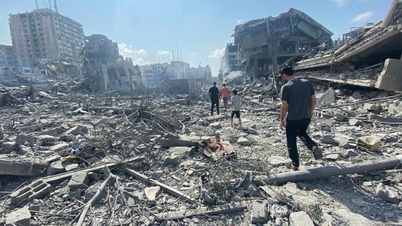








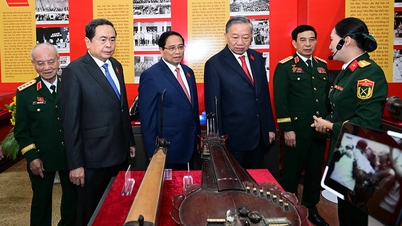

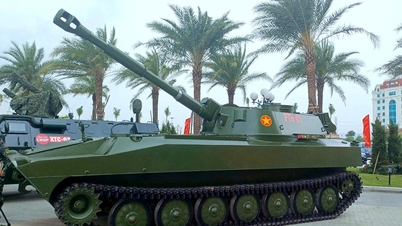
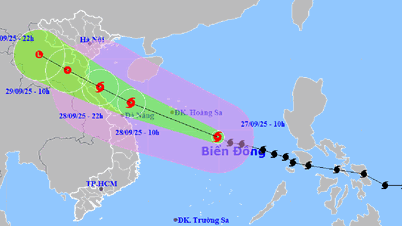




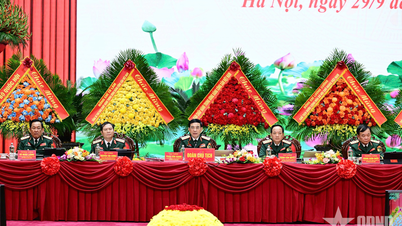
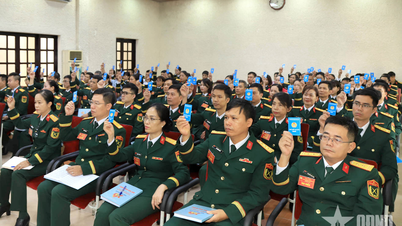
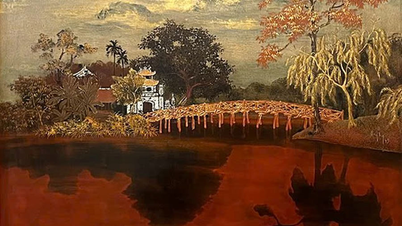
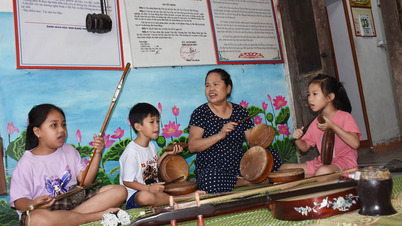
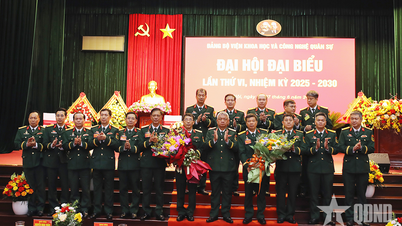
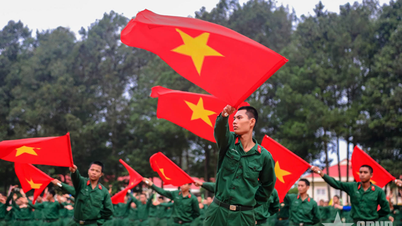

![[Photo] Panorama of the cable-stayed bridge, the final bottleneck of the Ben Luc-Long Thanh expressway](https://vphoto.vietnam.vn/thumb/1200x675/vietnam/resource/IMAGE/2025/9/30/391fdf21025541d6b2f092e49a17243f)
































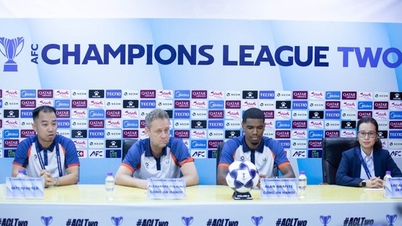

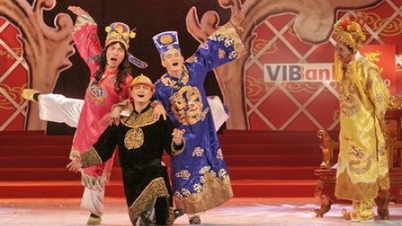

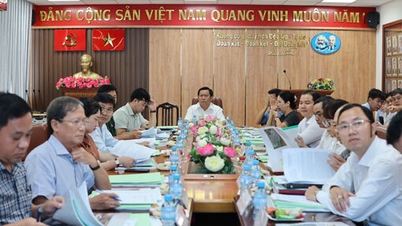

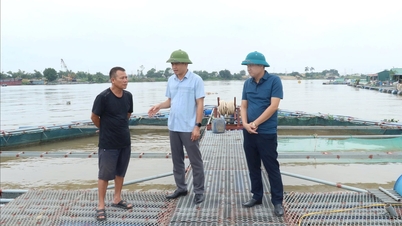



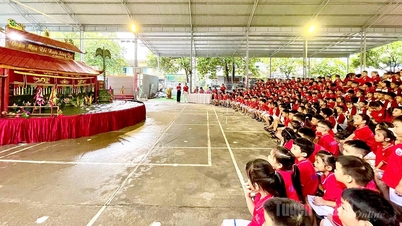














Comment (0)